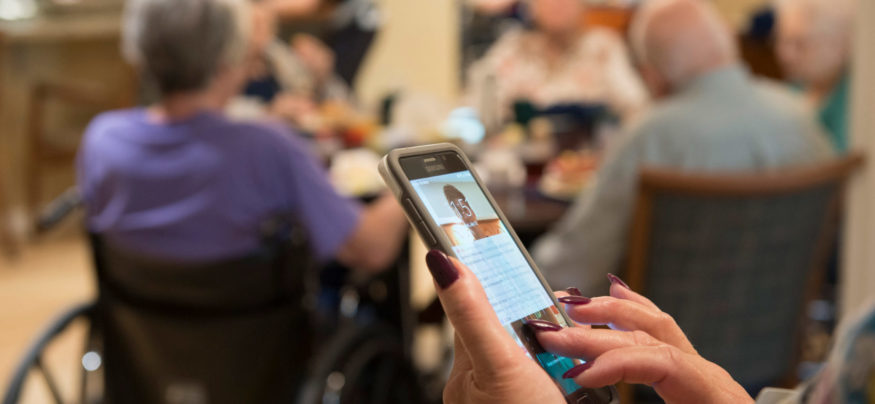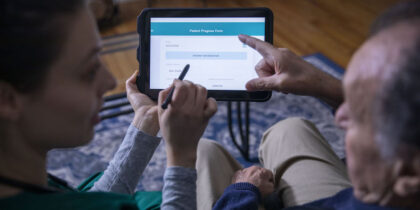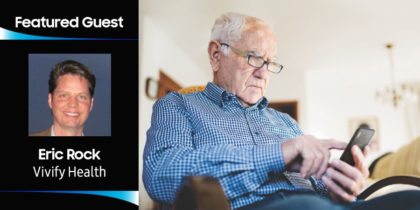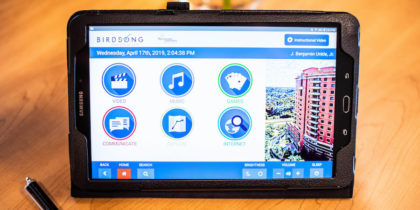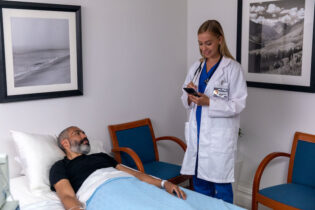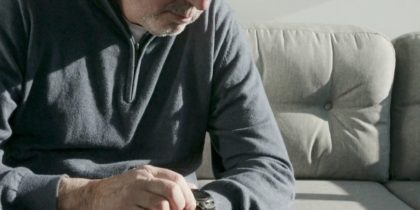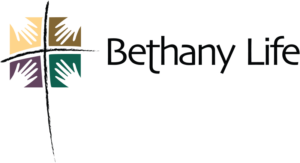
The Challenge
Bethany Life is a 100-year-old care community nestled in Story City, Iowa, that proudly provides comprehensive life and residential services for seniors, that range from an all-inclusive nursing home to at-home wellness and dementia care. They were facing the three-pronged problem of: A lack of insight into their dementia and Alzheimer’s patients’ behavioral health status; increased scrutiny from state and federal entities; and staff navigating a heavily paper-based documentation process. As a result, their staff was in need of a technology solution that would allow them to record and access information in real-time, thus improving their decision-making and increasing the overall quality of life for their patients.
The Solution
The long-term care facility quickly implemented behavioral health technology innovator VisibleHand’s app-based solution, Foresight, in one of their dementia houses. The behavior monitoring technology platform allows simple, real-time documentation of patient behavior via a durable unlocked Samsung Galaxy smartphone. An uncomplicated, icon-based solution, its interface facilitates easy use for users of all ages, at all levels, allowing caregivers to access individualized care information for each resident, including strategies to address their specific behavioral needs. After a brief ramp-up, Bethany Life trained their entire staff on the platform, supporting a seamless shift to the new system for their patients.
Required training takes as few as 5 minutes
The Results
Bethany Life now sees more patients being charted, due to the ease of use and fast (as low as 5 minutes) training time required to get users up and running on Foresight. Caregivers are able to make decisions closer to the point of patient care, clinical information is flowing more freely and the use of antipsychotics has markedly decreased. On the patient side, the community has also seen a noticeable decrease in reportable behaviors. Thanks to VisibleHand’s platform, the facility is now able to take a more proactive approach to resident care and shift to a more prevention-based perspective.


Bethany Life sits as a jewel of older adult care in central Iowa. The century-old retirement community serves its residents on a 180-bed campus, supported by its 318 employees. Those beds are divided into 10 “houses” that are spread across the community’s Main Street, which features a library, pub and bistro. Most importantly, it includes 50 beds for residents with progressed dementia or Alzheimer’s disease.
Three of their “houses” are licensed as CCDI (Chronic Confusion Dementing Illness)-locked dementia houses. Bethany Life maintains a nurse practitioner on-site full time, and also partners with a geropsychologist to provide their residents with monthly visits and consults as needed.
The most striking feature of Bethany Life is their “household model” — an approach to elder care that celebrates individual differences and provides a warm, comfortable, home-like environment, all supported by cross-trained staff including CNAs, RNs, LPNs and neighborhood coordinators who help “create life” for their residents.
The Customer Need:
Improving Patient Care Through Real-Time Data Access
Bethany Life was facing the complex challenge of addressing the increasing demands of providing behavioral healthcare for patients in an environment where regulations and industry standards required more complete, real-time, electronic documentation. Those challenges are further complicated in the case of aging adults, specifically in respect to navigating dementia and Alzheimer’s.
Bethany Life had a long history of addressing these challenges for its residents, but at the same time, faced the demand for increasingly precise and up-to-date documentation in their heavily paper-based system. They were thankfully on track to implement an EMR, but it would be a lengthy process. Those factors combined left their direct care staff in a position to care for their residents with limited or late information. This was no mere inconvenience — Bethany Life staff needed real-time information on which to base their decisions if they were to provide optimal care and contribute to the best possible outcomes for their patients.
Bethany Life was also facing pressure from both state and federal governments. In recent years, CMS has focused intently on reducing the use of antipsychotic medications in nursing homes and long-term care environments through the use of specific quality measures. Bethany Life needed the right tools to provide their patients with non-pharmacological solutions to behavioral health challenges.
Additionally, they faced state-level pressure in the form of compliance standards from the Iowa Department of Inspections and Appeals, which mandated reporting of even minor incidents. According to Kari Matheason, Bethany Life’s chief operating officer, “We were already spending a lot of time and energy dealing with state and federal scrutiny, and we couldn’t afford to have that.”
Most importantly though, their patients needed a truly “resident-centered” model of care. They needed to be able to provide individualized attention that was based on real-time data. It was unrealistic to expect their staff to remember and catalog long lists of minor nuances for each of their 17 assigned residents.
As Anna Christensen, RN/MDS coordinator, puts it, “We were in need of something accessible. Something where we didn’t have to run to computers to document our work.”
“It’s almost like predictive modeling … if we can intervene before it gets there, it increases resident and family satisfaction since their needs are being met.”
— Kari Matheason, chief operating officer, Bethany Life
The Solution:
A Mobile Solution Enhances Staff Communication and Efficiency
Bethany Life knew they needed a solution, and one they could implement efficiently. Through a mutual acquaintance, Matheason was introduced to long-term care technology innovator, VisibleHand.
Bethany Life was already using a mobile device solution for their nurse call system, so they were comfortable with the idea of another, especially if it was housed on a device like an unlocked Samsung Galaxy smartphone that was familiar, durable and easily accessible. “We were looking for a platform that was reliable, consistent and user-friendly … we needed the easiest experience possible,” shares Matheason.
The idea of not having to struggle with unfamiliar devices sold them on VisibleHand’s Samsung-based solution. The HIPAA platform, Foresight, provided complete support for caregivers, allowing them to directly impact the development, communication and tracking of best practices for each resident, all while remaining HIPPA-compliant and contributing to the drastic improvement of the behavioral health data available to both leadership and caregiving staff. The customizable, app-based platform went beyond being a simple data repository and provided clinical decision support along with the option to integrate with multiple EHR providers.
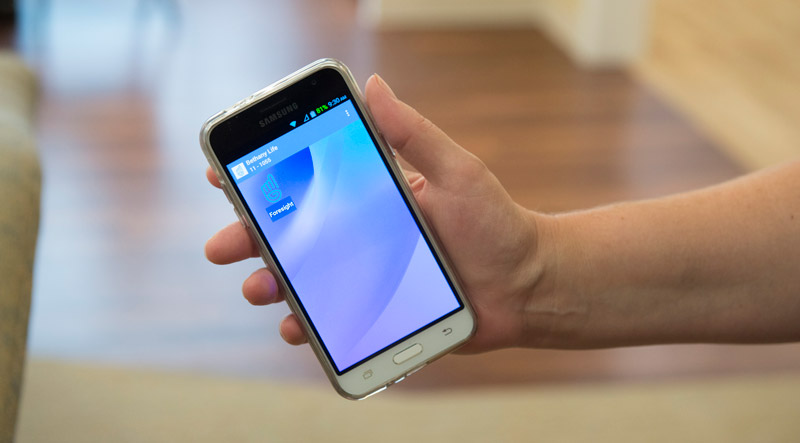
Foresight’s uncomplicated configuration and Samsung’s easy-to-use device was a particularly good fit for Bethany Life’s diverse staff. Training was simple and straightforward and allowed individuals the time to “play” in the system and build comfort. Bethany Life staff ranges in age from 16 to 70, so the platform’s simplicity, which Matheason describes as “very self-explanatory,” was critical to implementation.
A couple of the younger staff members have caught on so quickly that they’re teaching other team members more efficient ways to use Foresight. Matheason adds, “We’ve been using VisibleHand and haven’t had issues with loss or misplacement, even though our staff is using the device for less time throughout the day.”
The app has been deeply helpful across the board with no need for staff to jump through hurdles to make changes to resident files if a resident’s ability or situation changes. Foresight has been specifically designed to ease caregiver responsibilities by providing a proven and simple documentation flow that not only empowers staff, but also encourages efficient and accurate observations, even at management levels. According to Christensen, it’s “very supervisor friendly … it’s been great for all of us.”
From a management perspective, Foresight offers insight into how involved staff is with documentation. The staff is able to document real-time behavioral health information and immediately see whether the choices they’re making are working.
Users have found the platform incredibly intuitive, and the device easy to charge, with the overall experience being more reliable than other solutions they’ve used.
The Results:
Increased Patient Satisfaction and Staff Collaboration
As a result of the Foresight implementation, Bethany Life has seen results that revolutionized their care environment. “It fits perfectly. We’re able to customize each resident’s profile to likes, dislikes, behaviors to watch for … everything can be right there in one spot,” Christensen remarks.
They now see more patient information being charted on a more frequent basis. On a staff level, managers are now able to better see how involved their staff is, and front-line workers can see how their decisions connect with patient care. For example, they found that a certain patient, when they began to exhibit aggressive behavior, would show improvement if redirected to work on a puzzle. That association can now be instantly documented and shared with any staff member who interacts with the patient going forward, eliminating guess work for the closest caregivers.
Effectively, decision-making has been pushed closer to the residents than ever before. Staff members can now not only document patterns in their own work, but also share information and recognize trends outside the sphere of their responsibilities. Overall, they’ve seen an uptick in both collaboration and the flow of information and, according to Matheason, it’s been “100 percent worth the cost.”
One of the most marked results has been in the flow of clinical information. While previously, clinical information was concentrated in the nursing specialties, Foresight empowers managers to put clinical information into non-clinician hands to help provide a higher quality of life for their residents.
For management, reporting on antipsychotic use has become much more efficient. While prior reporting and reaction relied on government data that could be months old by the time they received it, now they work with real-time data, which is much more relevant and impactful. “Now we’re not stuck working with what happened six months ago; we know what happened this morning,” shares Matheason.
“It fits perfectly. We’re able to customize each residents profile to likes, dislikes, behaviors to watch for … everything can be right there in one spot.” — Anna Christensen, RN/MDS coordinator, Bethany Life
As for their patients, they’ve seen a decrease in reportable behaviors, largely because they’ve been able to be proactive about their care and catch warning signs of an episode before a situation escalates. For example, if they know a patient is going to start “sundowning,” a type of confusion that can occur late in the day with Alzheimer’s and dementia patients, they can take them for a walk around Main Street. Patient satisfaction has increased, which is a groundbreaking result for a population that frequently struggles with making their needs known. According to Matheason, “it’s almost like predictive modeling … if we can intervene before it gets there, it increases resident and family satisfaction since their needs are being met.”
The community is also incredibly proud that they have had zero behavior-related reports the Iowa Department of Inspections and Appeals since working with Foresight, and are freed up to focus more on the prevention of behavior and uncomfortable events.
Bethany Life is ready to expand the program: They’re hoping to see even more value emerge as their use of long-term care technology evolves and hopes to see the Samsung devices used for their nurse call system. They will also soon be tracking cost and time savings, as well as rates of reporting to the state if necessary.
VisibleHand has fundamentally impacted the service Bethany Life is able to provide its residents and care community, enabling them to continually align with the prevention-based orientation that is becoming fundamental to modern behavioral healthcare.
